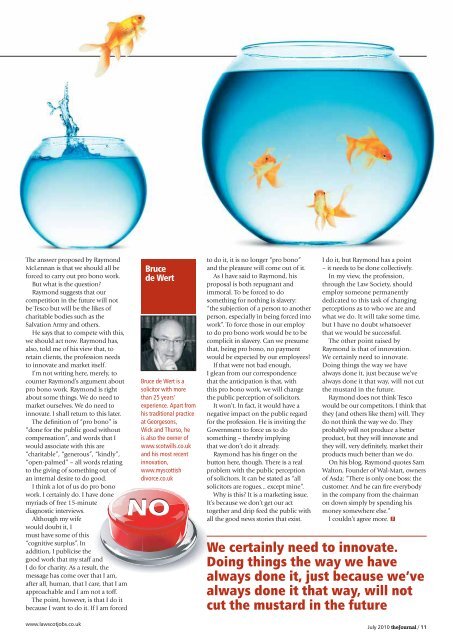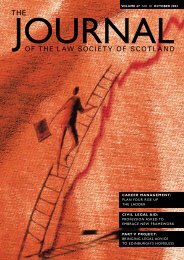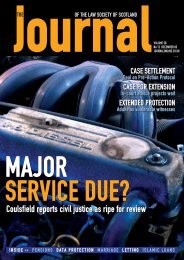Professional briefing - The Journal Online
Professional briefing - The Journal Online
Professional briefing - The Journal Online
Create successful ePaper yourself
Turn your PDF publications into a flip-book with our unique Google optimized e-Paper software.
<strong>The</strong> answer proposed by Raymond<br />
McLennan is that we should all be<br />
forced to carry out pro bono work.<br />
But what is the question?<br />
Raymond suggests that our<br />
competition in the future will not<br />
be Tesco but will be the likes of<br />
charitable bodies such as the<br />
Salvation Army and others.<br />
He says that to compete with this,<br />
we should act now. Raymond has,<br />
also, told me of his view that, to<br />
retain clients, the profession needs<br />
to innovate and market itself.<br />
I’m not writing here, merely, to<br />
counter Raymond’s argument about<br />
pro bono work. Raymond is right<br />
about some things. We do need to<br />
market ourselves. We do need to<br />
innovate. I shall return to this later.<br />
<strong>The</strong> definition of “pro bono” is<br />
“done for the public good without<br />
compensation”, and words that I<br />
would associate with this are<br />
“charitable”, “generous”, “kindly”,<br />
“open-palmed” – all words relating<br />
to the giving of something out of<br />
an internal desire to do good.<br />
I think a lot of us do pro bono<br />
work. I certainly do. I have done<br />
myriads of free 15-minute<br />
diagnostic interviews.<br />
Although my wife<br />
would doubt it, I<br />
must have some of this<br />
“cognitive surplus”. In<br />
addition, I publicise the<br />
good work that my staff and<br />
I do for charity. As a result, the<br />
message has come over that I am,<br />
after all, human, that I care, that I am<br />
approachable and I am not a toff.<br />
<strong>The</strong> point, however, is that I do it<br />
because I want to do it. If I am forced<br />
www.lawscotjobs.co.uk<br />
Bruce<br />
de Wert<br />
Bruce de Wert is a<br />
solicitor with more<br />
than 25 years’<br />
experience. Apart from<br />
his traditional practice<br />
at Georgesons,<br />
Wick and Thurso, he<br />
is also the owner of<br />
www.scotwills.co.uk<br />
and his most recent<br />
innovation,<br />
www.myscottish<br />
divorce.co.uk<br />
to do it, it is no longer “pro bono”<br />
and the pleasure will come out of it.<br />
As I have said to Raymond, his<br />
proposal is both repugnant and<br />
immoral. To be forced to do<br />
something for nothing is slavery:<br />
“the subjection of a person to another<br />
person, especially in being forced into<br />
work”. To force those in our employ<br />
to do pro bono work would be to be<br />
complicit in slavery. Can we presume<br />
that, being pro bono, no payment<br />
would be expected by our employees?<br />
If that were not bad enough,<br />
I glean from our correspondence<br />
that the anticipation is that, with<br />
this pro bono work, we will change<br />
the public perception of solicitors.<br />
It won’t. In fact, it would have a<br />
negative impact on the public regard<br />
for the profession. He is inviting the<br />
Government to force us to do<br />
something – thereby implying<br />
that we don’t do it already.<br />
Raymond has his finger on the<br />
button here, though. <strong>The</strong>re is a real<br />
problem with the public perception<br />
of solicitors. It can be stated as “all<br />
solicitors are rogues... except mine”.<br />
Why is this? It is a marketing issue.<br />
It’s because we don’t get our act<br />
together and drip feed the public with<br />
all the good news stories that exist.<br />
I do it, but Raymond has a point<br />
– it needs to be done collectively.<br />
In my view, the profession,<br />
through the Law Society, should<br />
employ someone permanently<br />
dedicated to this task of changing<br />
perceptions as to who we are and<br />
what we do. It will take some time,<br />
but I have no doubt whatsoever<br />
that we would be successful.<br />
<strong>The</strong> other point raised by<br />
Raymond is that of innovation.<br />
We certainly need to innovate.<br />
Doing things the way we have<br />
always done it, just because we’ve<br />
always done it that way, will not cut<br />
the mustard in the future.<br />
Raymond does not think Tesco<br />
would be our competitors. I think that<br />
they (and others like them) will. <strong>The</strong>y<br />
do not think the way we do. <strong>The</strong>y<br />
probably will not produce a better<br />
product, but they will innovate and<br />
they will, very definitely, market their<br />
products much better than we do.<br />
On his blog, Raymond quotes Sam<br />
Walton, Founder of Wal-Mart, owners<br />
of Asda: “<strong>The</strong>re is only one boss: the<br />
customer. And he can fire everybody<br />
in the company from the chairman<br />
on down simply by spending his<br />
money somewhere else.”<br />
I couldn’t agree more.<br />
We certainly need to innovate.<br />
Doing things the way we have<br />
always done it, just because we’ve<br />
always done it that way, will not<br />
cut the mustard in the future<br />
July 2010 the<strong>Journal</strong> / 11










